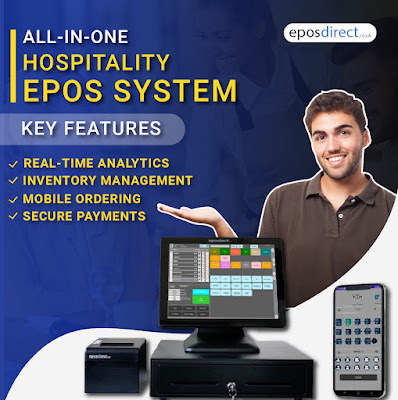The
hospitality industry has undergone significant transformations in recent years,
with technology playing a pivotal role in shaping the guest experience. One of
the most influential technological innovations in this sector is the Electronic
Point of Sale (EPOS) system. EPOS system for small businesses has
revolutionized the way hospitality businesses operate, from restaurants and
hotels to bars and cafes. In this article, we will explore the importance of
EPOS systems in future-proofing the hospitality industry and how they are
reshaping the landscape.
The Evolution of EPOS Systems
Electronic
Point of Sale (EPOS) systems have come a long way since their inception.
Originally designed as basic cash registers, they have evolved into
sophisticated and versatile tools tailored specifically for the hospitality
sector. Today, modern EPOS systems are more than just transactional devices;
they are comprehensive solutions that help streamline operations, enhance
customer experiences, and provide valuable insights.
Streamlining Operations
One of the
primary benefits of EPOS systems in hospitality is their ability to streamline
operations. In a fast-paced industry where efficiency is key, restaurant
EPOS system UK offers a range of features that simplify tasks for
staff and management alike. They enable real-time order processing, inventory
management, and seamless communication between the front and back of the house.
For
example, in a restaurant setting, EPOS systems can instantly transmit customer
orders from the table to the kitchen, reducing the risk of errors and improving
service speed. This not only enhances the customer experience but also
increases table turnover and revenue potential.
Enhancing the Customer Experience
In an era
where customer satisfaction is paramount, EPOS systems play a pivotal role in
enhancing the guest experience. They enable personalization by allowing staff
to access customer preferences and order history, enabling tailored
recommendations and more personalized service.
Furthermore, EPOS systems for Hospitality
can integrate with customer loyalty programs and offer various payment
options, including mobile payments and contactless transactions. This
flexibility caters to the preferences of modern consumers who seek convenience
and speed in their interactions with hospitality businesses.
Data-Driven Decision Making
In an
increasingly competitive industry, data-driven decision-making is essential for
success. EPOS systems capture a wealth of data, including sales trends, peak
hours, and customer behaviour. By analyzing this information, businesses can
make informed decisions about menu offerings, pricing strategies, and staffing
levels.
Moreover,
EPOS systems can help identify high-performing items and track inventory levels
in real time, reducing food waste and operational costs. This data-driven
approach not only boosts profitability but also contributes to sustainability
efforts—a growing concern in the hospitality industry.
Adaptability and Scalability
One of the
key factors in future-proofing any industry is adaptability. EPOS systems are
designed to evolve with changing industry trends and consumer preferences. They
are highly customizable and can be adapted to suit the unique needs of
different hospitality businesses.
For
example, a hotel can use an EPOS system to manage room reservations, spa
appointments, and dining reservations all from a centralized platform.
Similarly, a bar can integrate its EPOS system for restaurants with
inventory management software to track liquor usage and reorder supplies automatically.
This adaptability ensures that EPOS systems remain relevant and effective in a
dynamic industry.
Additionally,
EPOS systems are scalable, allowing businesses to expand their operations
without the need for significant infrastructure changes. Whether opening new
locations or introducing additional services, EPOS systems can seamlessly
accommodate growth.
Security and Compliance
The
hospitality industry is no stranger to security and compliance challenges,
especially when it comes to handling sensitive customer data and payment
information. EPOS systems are designed with robust security features to protect
against data breaches and unauthorized access.
They also
help businesses comply with industry-specific regulations, such as the Payment
Card Industry Data Security Standard (PCI DSS) for handling credit card
information. Compliance with these standards is crucial for maintaining trust
with customers and avoiding hefty fines.
The Role of Mobility
The
hospitality industry is increasingly embracing mobility as a way to enhance the
guest experience. EPOS systems have adapted to this trend by offering mobile
and tablet-based solutions. Servers can take orders directly at the table,
reducing wait times and improving accuracy. Hotel staff can check guests in and
out with mobile EPOS devices, providing a seamless and efficient check-in
experience.
Mobile
EPOS systems also facilitate on-the-go payments, allowing customers to settle
their bills conveniently from their smartphones. This not only speeds up the
payment process but also minimizes physical contact—a critical consideration in
the post-pandemic era.
Future Trends and Innovations
Looking
ahead, the future of EPOS systems in the hospitality industry promises even
more innovations. Artificial intelligence (AI) and machine learning
capabilities will become increasingly integrated into EPOS systems, enabling
predictive analytics, menu optimization, and intelligent customer engagement.
Voice
recognition technology may also play a role, allowing customers to place orders
or request assistance using voice commands. This enhances accessibility and
convenience, particularly for individuals with disabilities or language
barriers.
Blockchain
technology is another potential area of development, offering enhanced security
and transparency for transactions. By leveraging blockchain, EPOS systems can
further enhance trust in the integrity of financial and operational data.
Conclusion
In
conclusion, Electronic Point of Sale (EPOS) systems have become indispensable
tools for the hospitality industry. They offer a wide range of benefits, from
streamlining operations and enhancing the customer experience to providing
valuable data insights and ensuring security and compliance. EPOS systems are
highly adaptable and scalable, making them a crucial element in future-proofing
hospitality businesses.
As the industry continues to evolve, the Hospitality EPOS system will play a central role in driving innovation and meeting the changing needs and expectations of consumers. By embracing these technological advancements, hospitality businesses can thrive in an increasingly competitive landscape and provide memorable experiences that keep guests coming back for more. Future-proofing the hospitality industry begins with embracing the power of EPOS systems, ensuring a bright and prosperous future for all stakeholders.

